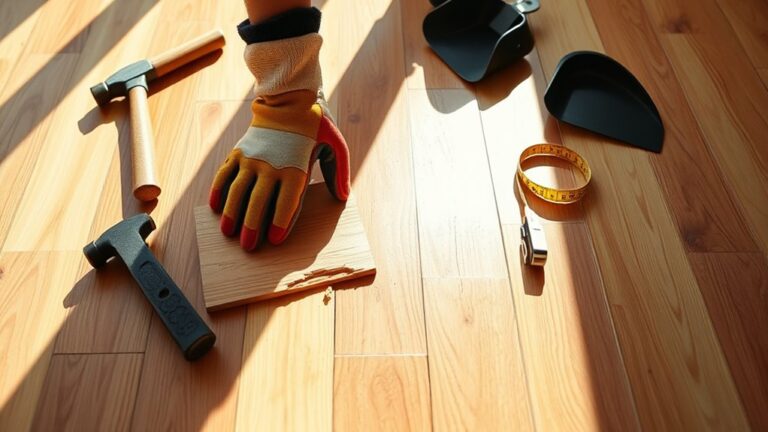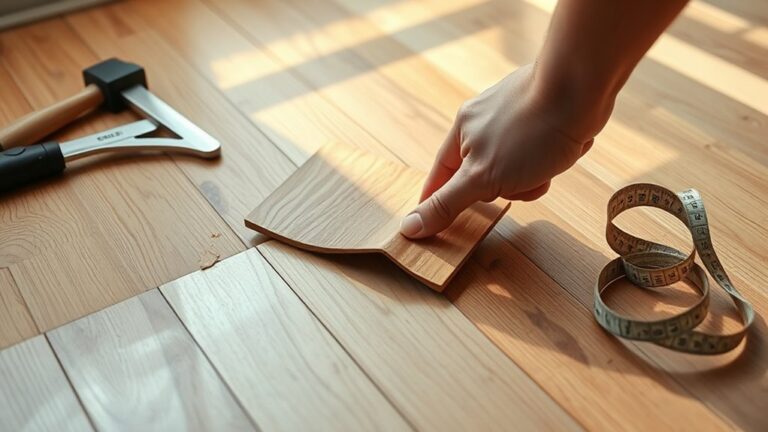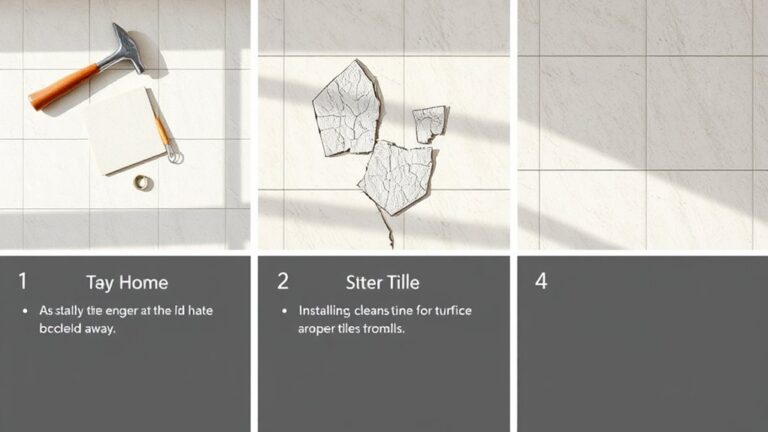You'll want to hire a professional for floor installation when the project involves complex materials or intricate designs, such as tile or hardwood, which require precise techniques. If your skill level is limited or you're unfamiliar with necessary tools, a professional can guarantee a high-quality finish. Also, if you're facing tight timelines, professionals often complete jobs faster due to their experience. Reflect on your budget too; while DIY might seem cheaper, hidden costs can add up. Ultimately, investing in expert installation can provide long-term value and warranties you wouldn't get otherwise. There's more to think about beyond these basics.
Understanding Your Flooring Needs
Understanding your flooring needs is essential before diving into installation. Start by evaluating the specific requirements of your space. For instance, bathrooms and kitchens often have higher moisture levels, which may necessitate water-resistant materials like luxury vinyl. Knowing the conditions in your area helps you choose a flooring type that fits your lifestyle and environment.
Next, evaluate the complexity of the flooring you wish to install. If you're considering intricate designs or heavier materials, these may require specialized skills and tools best handled by professional installers. Their expertise guarantees the installation process runs smoothly, avoiding the pitfalls of a DIY approach.
Your budget is another critical factor. It's not just about the cost of materials; you should also consider the potential savings from hiring professionals. Skilled installers can minimize waste and avoid costly mistakes, ultimately saving you money in the long run. Plus, think about your project's timeline. Professional installers typically complete jobs in a fraction of the time it would take you, thanks to their experience and efficiency.
Lastly, reflect on your own skill level. If the installation process feels overwhelming or beyond your expertise, hiring a professional can guarantee a high-quality finish while reducing the risk of errors. By clearly understanding your flooring needs, you can make informed decisions that align with your goals and desired freedom in your living space.
Evaluating Your Skill Level
Before you decide to tackle flooring installation yourself, assess your previous DIY experience, especially with similar projects. Identify the complexity of the flooring type you plan to install, as intricate designs often require specialized skills. Additionally, make certain you have access to the right tools, as using improper equipment can severely impact the quality of your installation.
Assessing DIY Experience
How well do you know your DIY skills when it comes to floor installation? Evaluating your DIY experience is essential before diving into this type of project. Start by gauging your familiarity with various flooring types and installation techniques. Remember, professional installers possess specialized training that often exceeds typical DIY capabilities.
Next, consider the complexity of your flooring project. Intricate designs or high-end materials usually require a level of skill and experience that most DIYers may lack. Additionally, reflect on your access to proper tools; without the right equipment, you might struggle to achieve quality results, unlike a professional flooring installation.
It's also wise to reflect on past DIY projects. If you've found yourself repeatedly making mistakes, hiring a professional can save you time and money in the long run. Finally, think about your time commitment. If your schedule is tight, a professional installer can efficiently complete the job, ensuring a stress-free experience. Ultimately, being honest about your capabilities and resources will guide you in making the best decision for your flooring needs.
Identifying Installation Complexity
Evaluating your DIY skills sets the stage for identifying the complexity of your floor installation project. Start by gauging your familiarity with various flooring materials, as some, like hardwood or tile, require specialized knowledge. If you're not well-versed in installation techniques, you might encounter significant installation complexity that exceeds your skill level.
Next, consider the intricacies of the installation area. Features such as stairs or uneven surfaces often demand professional expertise to guarantee proper alignment and safety. If you're unsure about how to handle these challenges, hiring professional flooring installers can save you from costly errors.
Evaluate your experience with tools, too. If you lack access to or knowledge of specialized flooring tools, a DIY flooring project may lead to damage or wasted materials. Additionally, reflect on your problem-solving skills; professionals are typically better prepared to tackle unforeseen challenges that arise during installation.
Lastly, recognize the time commitment required. If your schedule is tight, professional installation can expedite the process, delivering quality results more efficiently than most DIY efforts. By considering these factors, you can make an informed decision about whether to proceed on your own or enlist the help of professionals.
Understanding Tool Requirements
When diving into a floor installation project, understanding the tool requirements is key to guaranteeing a successful outcome. Evaluating your skill level is essential, as professional installation typically involves specialized tools like saws, nailers, and leveling equipment that many DIYers may not own or know how to use. Using the wrong tools can lead to damage or subpar results, which can be frustrating and costly.
Inexperienced installers often lack knowledge about the proper tools needed for different flooring types, risking errors during the installation process. Professionals come equipped with high-quality, specialized tools designed for precision, minimizing the risk of mistakes compared to standard home tools.
Additionally, consider the complexity of your chosen flooring material; it can greatly influence whether your skills align with the necessary tools and techniques. Investing in professional installation not only guarantees a flawless finish but can also save you from hidden costs associated with purchasing or renting expensive tools you may only use once. If your expertise doesn't match the tool requirements, hiring a professional may be your best bet for a successful installation.
Assessing Project Complexity
When evaluating project complexity, it's essential to take into account the type of flooring you're installing, as materials like hardwood demand more precise techniques than vinyl or laminate. Additionally, intricate space layouts with multiple angles or varying levels may present challenges that exceed typical DIY capabilities. Understanding these factors can help you determine whether professional expertise is necessary to achieve a successful installation.
Flooring Type Considerations
How can the type of flooring impact your decision to hire a professional? Flooring type considerations are significant in determining whether to attempt a DIY flooring installation or hire a professional. Intricate patterns, like herringbone hardwood, demand advanced skills and precision that most DIYers may not possess. If you choose luxury vinyl or tile, you'll face complex cutting and fitting that can benefit from professional installation.
Engineered hardwood, while popular, necessitates specialized techniques for proper acclimation and subfloor preparation, which professionals have the experience to manage. In moisture-prone areas, such as bathrooms or basements, hiring an expert is essential to guarantee proper waterproofing and installation methods are correctly applied. Additionally, if your project involves multiple flooring types or shifts, the expertise of a professional can help achieve seamless integration, enhancing aesthetic appeal.
Ultimately, evaluating the types of flooring you're considering will guide your decision to hire a professional. A well-executed installation not only provides durability but also elevates your space's overall look and feel. Don't underestimate the value of professional expertise in complex flooring projects.
Installation Techniques Required
Evaluating the complexity of your flooring installation project is vital in determining whether you should tackle it yourself or enlist a professional. Complex flooring projects, especially those involving intricate patterns or unique materials, often require advanced installation techniques that may exceed your DIY skills. For instance, installations like hardwood or luxury vinyl require precise leveling and specific underlayment, which professionals are trained to handle.
Here's a quick overview of common flooring types and their installation complexities:
| Flooring Type | Installation Complexity |
|---|---|
| Hardwood | Requires precise leveling and underlayment |
| Luxury Vinyl | Needs exact fitting and moisture control |
| Tile | Involves cutting and fitting for a seamless look |
| Natural Stone | Demands expertise to avoid water damage |
| Carpet | May require stretching and specialized tools |
If your project includes challenging layouts, understanding the materials required and the necessary installation techniques is essential. Professional floor installation can save you from costly mistakes and guarantee a flawless finish. By evaluating these complexities, you can make an informed decision about whether to DIY or hire a pro.
Space Layout Challenges
Maneuvering space layout challenges is essential for a successful flooring installation. When dealing with complex space layouts—like those featuring multiple corners, angles, or varying floor heights—hiring a professional can greatly enhance your home improvement project. Professionals are equipped with advanced tools and techniques that enable them to take accurate measurements and make necessary adjustments in challenging environments, reducing the risk of costly mistakes that often occur in DIY installations.
In areas that demand intricate designs, such as patterned tile or multi-layered flooring, specialized knowledge becomes vital for effective execution. Difficult-to-access spaces, including tight corners and staircases, can also pose considerable challenges for those without training. Professionals are adept at maneuvering through these intricacies, ensuring a precise and polished result.
As you assess your project's complexity, consider whether the installation involves shifts between different flooring types or requires specialized skills. If so, enlisting a professional's expertise might be the most prudent choice for achieving a seamless and aesthetically pleasing outcome. Ultimately, understanding the demands of your space can save you time, effort, and potential frustration in your flooring journey.
Considering Time Constraints
When you're facing tight deadlines for floor installation, hiring a professional can be a game-changer. Time is often of the essence, especially if you're preparing for an important event or business opening. Professional flooring installers can complete your project in just days, while a DIY approach might stretch into weeks or even months. This significant time savings is vital when you're keen to enjoy your new flooring.
Moreover, professional installers come equipped with the experience to quickly identify and resolve any issues that may arise during the installation process. Their expertise not only helps streamline the project timeline but also minimizes disruptions to your daily life. Unlike DIY efforts, which often suffer from scheduling delays, hiring a professional allows for flexible scheduling options, ensuring that your installation aligns with your timeline.
Additionally, relying on experts gives you peace of mind knowing that complex installations are handled efficiently. Professionals possess the necessary tools and techniques that can expedite the installation process, ensuring that your new flooring is both aesthetically pleasing and functional. This is particularly beneficial for homeowners who may not have the time or resources to invest in learning the intricacies of flooring installation.
Budgeting for Installation Costs
As you begin your flooring installation project, understanding the budgeting process is fundamental to avoid financial surprises down the line. Start by considering the costs associated with professional installation, which generally ranges from $1 to $3 per square foot. This expense can greatly impact your overall budget, so it's imperative to get accurate measurements to estimate the total square footage needed.
If you're leaning toward a DIY approach to save on labor costs, remember that while you could save up to 50%, hidden expenses can quickly add up. Tools, materials, and potential waste from errors can offset those savings, making precise budgeting essential. Always factor in a contingency for mistakes or miscalculations, as these can lead to higher material costs than you initially estimated.
On the other hand, hiring a professional flooring company usually provides a thorough quote that includes all necessary materials. This transparency helps minimize unexpected costs throughout the installation process. Additionally, investing in professional installation may offer long-term savings due to warranty coverage. Such warranties protect you against defects or installation errors, potentially saving you from costly repairs in the future.
Ultimately, whether you choose DIY or hire a professional, meticulous budgeting is key. By planning ahead and considering all potential costs, you can guarantee your flooring project aligns with your financial goals and desires for freedom in your living space.
Importance of Quality Assurance
Quality assurance in flooring installation is essential for achieving a durable and visually appealing result. When you hire professionals, you benefit from their expertise, which guarantees your flooring is installed properly and meets high standards. Professionals know the nuances of various materials and techniques, avoiding common pitfalls that could compromise both the aesthetic and structural integrity of your floors.
Consider the advantages of quality assurance when hiring a professional flooring installer:
- Expertise: Knowledgeable installers can recommend the best flooring options suited to your space.
- Advanced Tools: They utilize specialized equipment to guarantee precision, resulting in seamless seams and perfect alignment.
- Warranties: Many services offer warranties on their work, giving you peace of mind against potential defects or errors.
- Cost Savings: A proper installation minimizes the risk of expensive repairs or replacements down the line.
While there are pros and cons to every decision, the assurance provided by professionals can save you time, money, and stress. By guaranteeing your flooring is installed correctly from the start, you're not just investing in a beautiful home; you're investing in longevity and functionality. So, when weighing your options, remember that quality assurance is a pivotal factor in the overall success of your flooring project. Opting for professional installation may very well be the freedom you seek in your home improvement journey.
Long-Term Value of Professional Work
Investing in professional floor installation can greatly enhance the long-term value of your property. When you opt for professional installation, you're not just paying for labor; you're investing in quality that can elevate your home's aesthetic appeal and potentially boost property value by 10-15%. This is particularly crucial for high-end materials like hardwood flooring, where a skilled installer can guarantee the job is done right.
Professional installers bring expertise that minimizes the risk of costly mistakes. They often provide warranties of 1-5 years, offering protection against defects and installation errors, which could save you from expensive repairs down the line. Choosing durable flooring options, recommended by experts, can also extend the lifespan of your flooring—some materials can last over 20 years when installed correctly.
Moreover, professional installers typically have access to superior materials and industry discounts, allowing you to achieve a high-quality finish without breaking the bank. This means that while DIY projects may seem cost-effective initially, the long-term value of professional installation often outweighs the upfront savings.
Frequently Asked Questions
When Should Flooring Be Installed?
You might think you can install flooring whenever you want, but timing's essential. Ideally, flooring types should be installed after major renovations and before moving in, ensuring room preparation is ideal. Consider installation methods that suit your DIY skills and the chosen materials. Favorable weather conditions also matter, as extreme temperatures can impact your project. Schedule your installation during off-peak seasons for better availability and potentially lower costs, giving you more freedom in your choices.
How Much Do Most Contractors Charge to Lay Flooring?
Most contractors charge between $1 to $3 per square foot for flooring installation costs, influenced by factors like flooring materials and project scope. Local rates can vary greatly, so it's wise to gather multiple estimates. Contractor experience plays an essential role in pricing, as seasoned professionals often provide higher quality work and efficiency. Remember to take into account any additional costs, such as removal of existing flooring, to get a complete picture of your project's expenses.
What Is the Best Time of Year to Install Hardwood Floors?
The best time of year to install hardwood floors is during fall or spring, considering seasonal considerations. Moderate humidity levels during these seasons minimize humidity effects, preventing wood expansion or contraction post-installation. Installing in summer can lead to moisture issues, while winter's low temperatures may cause wood shrinkage. Proper installation timelines and allowing flooring material to acclimate for at least 72 hours is essential for ideal results, ensuring a lasting, beautiful floor.
How Much Do Flooring Installers Charge per Hour?
Imagine stepping onto beautifully installed floors, yet you wonder, how much will it cost? Flooring installers typically charge between $25 to $75 per hour, influenced by cost factors like installation techniques and flooring types. Regional differences can also play a role in pricing. To guarantee you're getting a fair deal, ask for estimates and consider hiring tips to help you navigate this investment. Your dream floors are just a conversation away!




